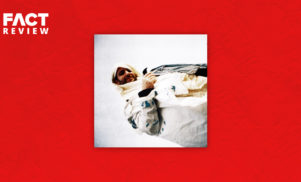On Les Fleurs Du Mal, Rabit harnesses the influence of Charles Baudelaire, Current 93 and Coil to shed the rhythmic and melodic chains of his previous work and embark on a journey into hedonism, mysticism and spirit. John Twells submerges himself in an acid bath of sound that highlights the disruption and malaise of the modern world.
“Dear Beelzebub, I adore you,” a French voice stutters as Les Fleurs Du Mal stirs into existence. These are the closing words of Charles Baudelaire’s controversial ‘Le Possédé’, recited by Cecilia in full on ‘Possession’ and obfuscated by eerie grime stabs. Underpinned by crack commandments and the rhythmic clink of steel on Pyrex, the track drags the listener into Rabit’s psyche in a tumble of carnivalesque color, religious symbolism and death metal drama that’s completely by design.
Les Fleurs Du Mal is a welcome crystallization for the producer, born Eric Burton, who described it to The FADER as his “purest statement yet.” He achieved notoriety as an unwitting component of the experimental grime scene when Double Dragon captured hearts, minds and SoundCloud followers back in 2013. But by the time he released his debut album Communion two years later, Burton’s interests had shifted and he began to obscure his well-worn grime and rap signifiers in sheets of white noise and layers of diegetic sound, allying himself with a polarizing wave of “deconstructed club” vanguards.
Here, Burton finally allows himself to sever a cultural cord, ignoring the contemporary loop of de- and re-construction in search of deeper truths. He cites Current 93’s controversial founder David Tibet as an influence and exchanged messages with the neo-folk mystic as he was piecing together the record. ‘Dogsblood Redemption’ addresses this inspiration directly, nodding to Current 93’s terrifying 1983 full-length Dogs Blood Rising. It was Tibet, in fact, who inspired Burton to dive headfirst into literature for inspiration and, in doing so, persuaded the producer to be unafraid of crafting what might be described as “lower” forms of music.
This breakthrough has freed Burton considerably. Communion was a powerful album that dated itself inadvertently, catching a wave that soon drowned it. But Les Fleurs Du Mal is markedly distinct – obstinate even, as Burton repeatedly makes choices that refuse to endear him to the casual listener. There are few “songs” here; rather, this is a series of haunted, psychedelic vignettes – bite-sized musings that reach for the darkest and lightest recesses of the spirit, discarding the husk of mediocrity and laziness.
Stylistically, Burton covets the industrial deviancy of his most formative influence: Coil. The pioneering act have long been an obsession, but here Burton allows himself to not exactly replicate their blend of wonky electronics and sexually-charged experimentation, but take the template and apply it to a different form. It shouldn’t be too surprising then that ex-Coil man Drew McDowall makes an appearance, offering modular synthesizer blurts for Burton to reconfigure completely. But it is Burton’s dedication to the hedonism, sexuality and illicit mysticism of Baudelaire that feels most indebted to John Balance and Peter Christopherson’s magickal musick.
Baudelaire sits at the front and center of the album, which takes its title from the French poet’s most notorious volume. Published in 1857, the poems shocked and disgusted France and Baudelaire was convicted, along with his publisher, for what was described as an assault on public morality. His dislike and subversion of romanticism alarmed conservatives and his reliance on decadence and abstraction was seen as a danger to impressionable minds. Baudelaire was presciently toying with perception – finding beauty in the urban landscapes that blotted out traditionalism and forecast an age we’re still in thrall of.
Burton takes Baudelaire’s thread and knots it into what he describes as “deep content”, disregarding the “song” with its melodies and structured rhythms to attempt something more gestural. On ‘The Whole Bag’, trace rhythmic elements peek out from their superb cadaver, devouring familiar sounds with worms’ kisses. ‘Rosy Cross’, meanwhile, references masonic mysticism through the smog of industry, allowing the noise to subside for a moment as plucked strings echo through the abyss.
Les Fleurs Du Mal finds beauty in the modern world’s unrelenting ugliness – it doesn’t celebrate it, but explores at least part of it. “Music often transports me like the sea,” Baudelaire writes in ‘La Musique’. “I feel vibrating within me all the passions; of ships in distress.” This polar unease is Burton’s greatest triumph – he damns nothing, exploring darkness until it becomes oddly airy and lightness until it’s crushingly solemn. In doing so, it feels representative of our disrupted, rapidly-changing reality. “She is weeping, fool, because she has lived; and because she lives,” muses Baudelaire in ‘Le Masque’. “But what she deplores; most, what makes her shudder down to her knees; is that tomorrow, alas! she will still have to live; tomorrow, after tomorrow, always! — like us!”
John Twells is FACT’s managing editor. Find him on Twitter.
Read next: Berlin club disrupter Ziúr’s sci-fi soundscapes search for meaning in the universe





























